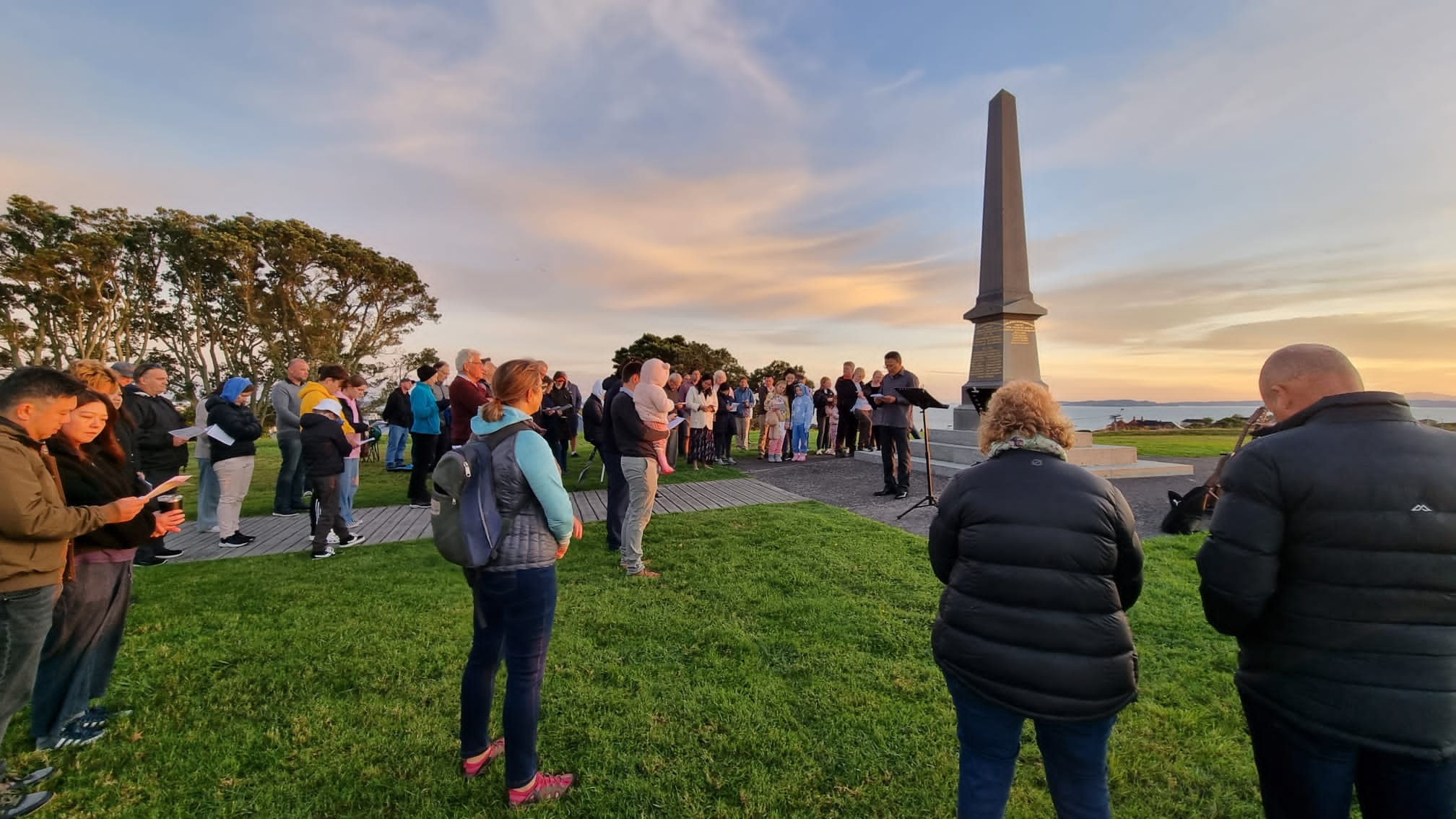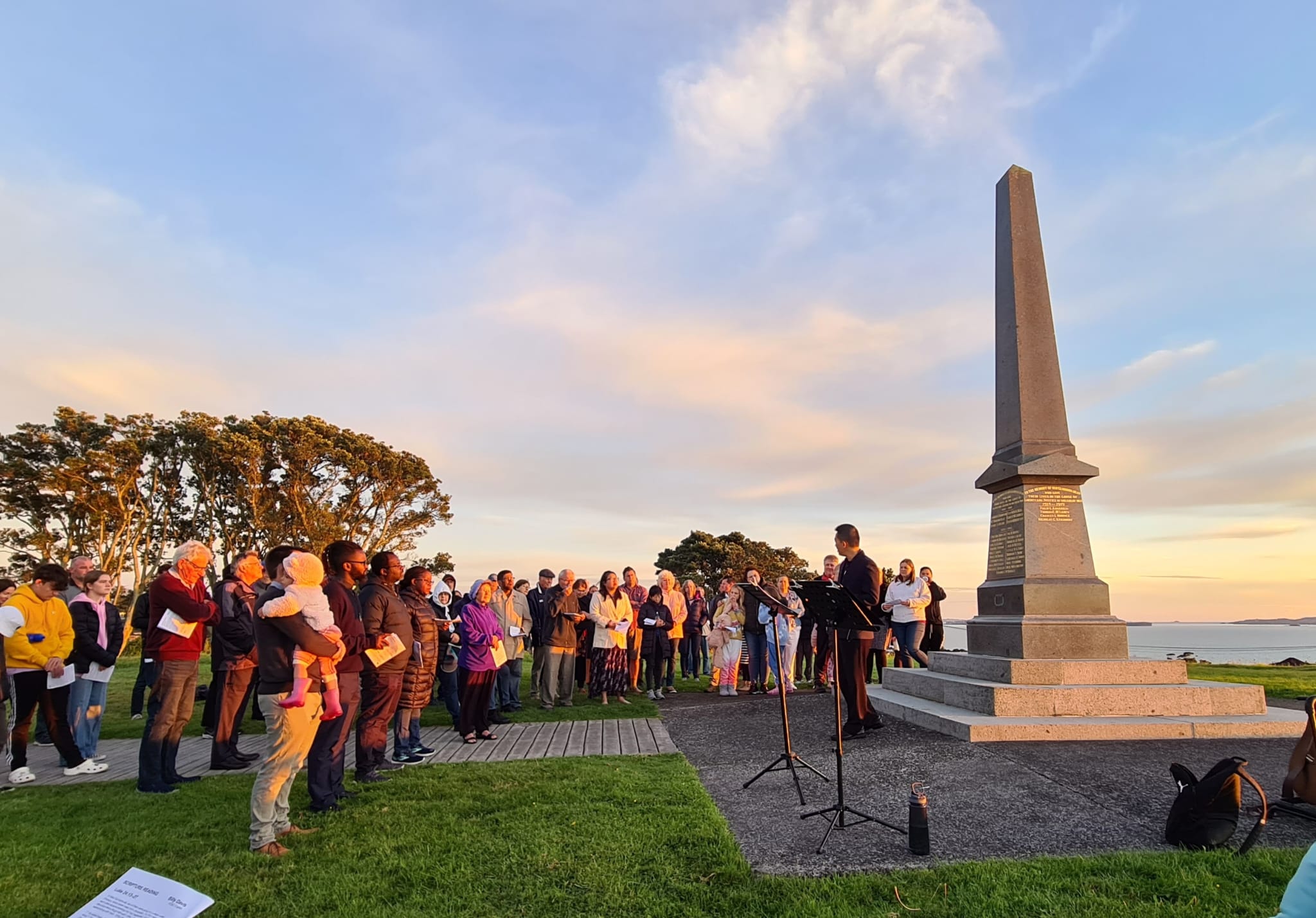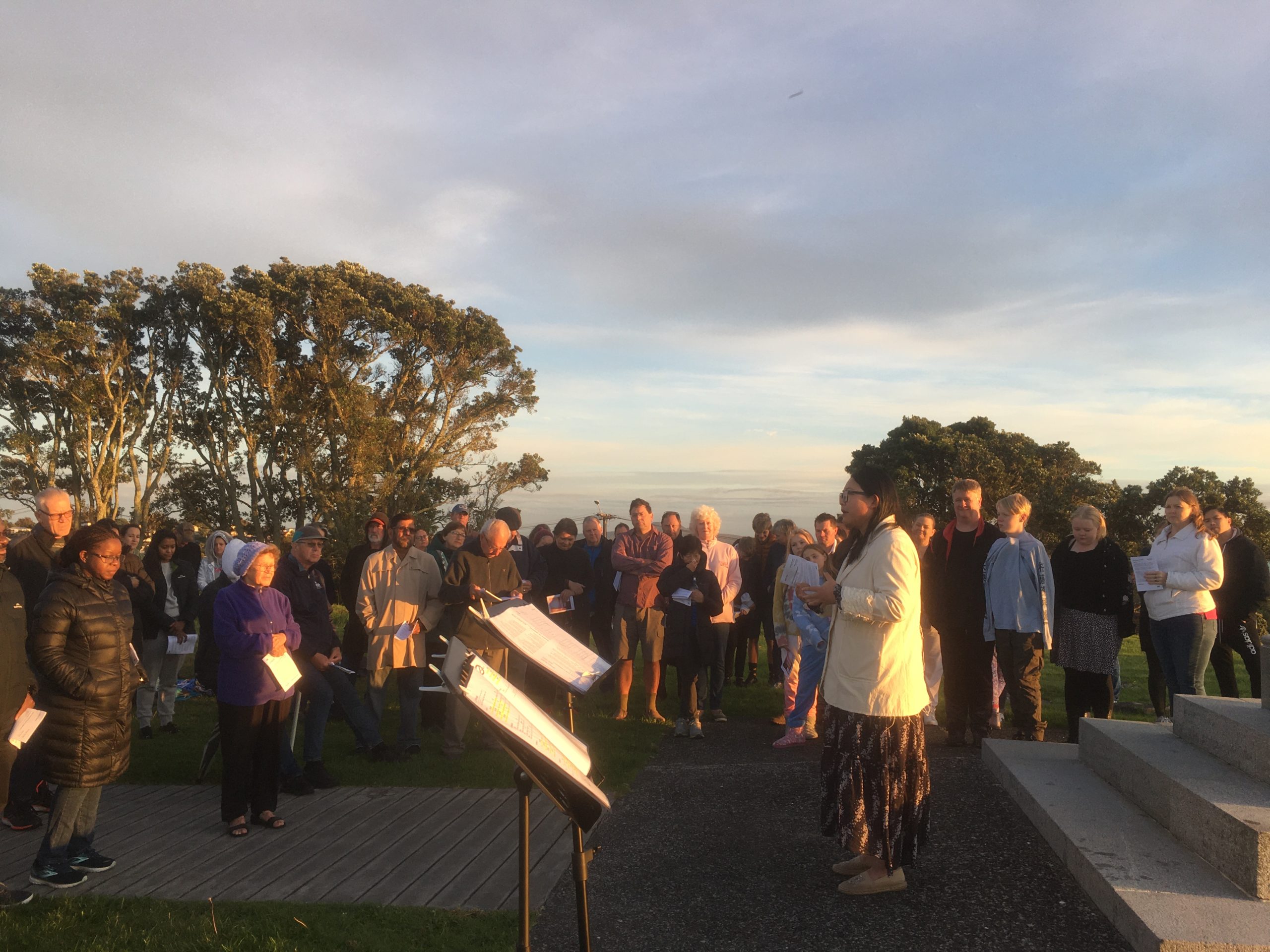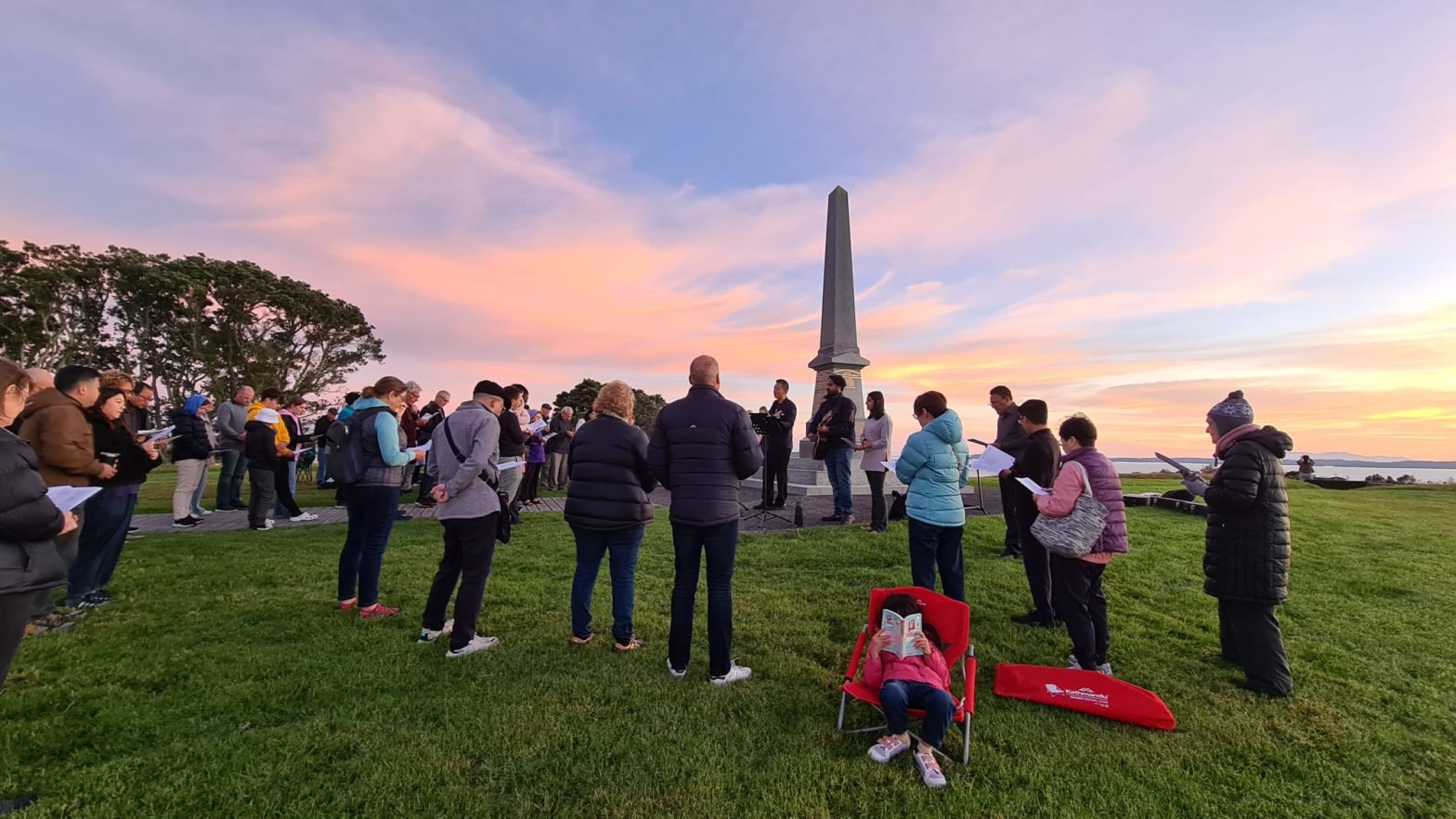In God’s kindness, this year I had the joy of helping with organising the annual East Auckland Combined Churches Easter Sunrise service. As mentioned before by Rev Richard Waugh (who helped to start these sunrise services over 30 years ago), it’s a small but significant opportunity to partner with other local churches to share our Christian faith publicly in a beautiful setting.



I was very thankful for brothers and sisters who shared prayers, readings and reflections, including two of our local MPs Simeon Brown and Naisi Chen and Mike Turinsky from the Howick Local Board. After our initial preacher had to pull out, I stepped in to bring a short message from the first Easter morning.
My outdoor sermons are still a work in progress (share the gospel, less is more, it’s hard to pay attention with a brisk north wind in your face), but for what it’s worth, here is what I shared from Luke 24:27 yesterday morning.
Reading: Luke 24:13–27
13 Now that same day two of them were going to a village called Emmaus, about seven miles from Jerusalem. 14 They were talking with each other about everything that had happened. 15 As they talked and discussed these things with each other, Jesus himself came up and walked along with them; 16 but they were kept from recognising him.
17 He asked them, “What are you discussing together as you walk along?” They stood still, their faces downcast. 18 One of them, named Cleopas, asked him, “Are you the only one visiting Jerusalem who does not know the things that have happened there in these days?”
19 “What things?” he asked. “About Jesus of Nazareth,” they replied. “He was a prophet, powerful in word and deed before God and all the people. 20 The chief priests and our rulers handed him over to be sentenced to death, and they crucified him; 21 but we had hoped that he was the one who was going to redeem Israel. And what is more, it is the third day since all this took place. 22 In addition, some of our women amazed us. They went to the tomb early this morning 23 but didn’t find his body. They came and told us that they had seen a vision of angels, who said he was alive. 24 Then some of our companions went to the tomb and found it just as the women had said, but they did not see Jesus.”
25 He said to them, “How foolish you are, and how slow to believe all that the prophets have spoken! 26 Did not the Messiah have to suffer these things and then enter his glory?” 27 And beginning with Moses and all the Prophets, he explained to them what was said in all the Scriptures concerning himself.
As we’ve just heard from Luke’s gospel, on the first Easter Sunday two friends were walking from Jerusalem to Emmaus. Chatting and conversing for 11km. If they had owned smartwatches back then, they would have clocked around 14,000 steps.
But before they reach their destination, we see that the risen Lord Jesus starts walking with them. And he asks them: “What are you discussing?” (Lk 24:17)
While Cleopas and his friend didn’t recognise Jesus at first, they weren’t ignorant about him. They knew all about what he had done, and what happened to Him on Good Friday. They had hoped he would rescue their country. They were aware of reports about the resurrection. Yet how does Jesus respond to them? He says they were “slow to believe”, even “foolish” (v25). And if Jesus is just head knowledge to us too, just a bunch of facts, then we too would also be foolish. Needing a change of heart.
Jesus then says:
“Did not the Messiah have to suffer these things and then enter his glory?” And beginning with Moses and all the prophets, he explained to them what was said in all the Scriptures concerning himself”. (v26-27)
Why did God want us to listen in on this conversation? What might the first Easter Sunday lesson say to us in Auckland, in 2023? Can I suggest three things this verse tells us. Firstly, it is that
1. The good news of Jesus is explained…
Once when I was reading Mark’s Gospel with a work colleague from India, his question was: “Who is Mark?” Our city is changing. More and more of our friends and family will have no prior knowledge of Christianity. Others will only know of stereotypes and caricatures. Still more will have experienced hurt and hypocrisy, handed over in Jesus’s name.
Notice how Jesus stayed with these two friends when they stopped walking, sadness on their faces (v17). And notice how much time Jesus gave them as he listened to them. But eventually our Lord explained the good news to them (v27). And just like the risen Lord Jesus “explained” the Scriptures, we who know God’s story of redemption have the privilege of sharing it. With gentleness and respect. With our friends and family. On Easter Sunday and every other day until Christ returns to judge our world. The good news of Jesus is explained.
Secondly, this verse reminds us:
2. The good news of Jesus is explained patiently and openly…
We all come from different backgrounds. But let’s agree that sitting in Auckland traffic is no fun (Living in Pakuranga, I get to see the scowls on a long line of faces!). Sitting in traffic teaches us to be patient. But at least you can enjoy your privacy. But picture again this Easter morning conversation. As they walk and talk, many others departing from the Passover festival are passing by, overhearing things. And it’s a long walk. To share good news like Jesus did on Easter Sunday, is to do it patiently and openly.
We need patience, because it takes time for friends to change their minds. For family members to understand why we’re broken. For us to sense the burning in our hearts when the good news of Jesus becomes clear to us.
And we need to be open, because in 2023 we cannot expect our non-Christian friends to walk into our church buildings. We cannot expect voices in wider society to speak from a Christian worldview. The good news of Jesus is to be explained patiently and openly: whether on top of a hill in Howick, around your dining table, by the coffee machine, at your family’s bedside.
Finally, this verse says:
3. The good news of Jesus is explained patiently and openly from all the Scriptures.
We live in a time when the Bible is extremely accessible, yet extremely misunderstood. So it will not do to know one verse from Genesis, one from Leviticus, 1 or 2 Psalms. Jesus taught “beginning with Moses and all the prophets” (v27). Because every book of the Bible has something to say about the God of the Universe, our true human condition, and humanity’s need for a Saviour. Every problem the Bible raises: our guilt, shame, our selfishness – God solves by sending his Son Jesus to the world. His death and resurrection saves us from sin, frees us from slavery, gathers a new people who follow him in the power of the Holy Spirit.
As the author C.S. Lewis puts it, “I believe in Christianity as I believe that the sun has risen: not only because I see it, but because by it I see everything else.”
So can I encourage you, if you’re not yet a Christian, to consider visiting one of the 60+ churches in our local area. Find a Bible-teaching church who gather weekly to “Remember Jesus Christ, raised from the dead, descended from David.” (2 Tim 2:8). As the sunrise behind us signals a new beginning, I pray today might signal a new beginning for you. For Christ is risen; He is risen indeed!




